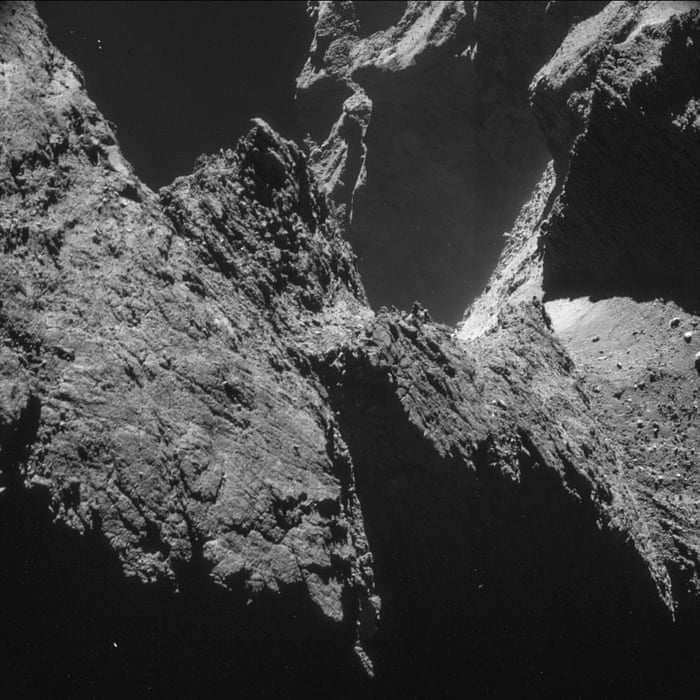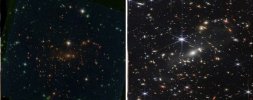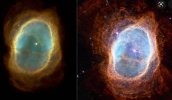-
IMPORTANT // Please look after your loved ones, yourself and be kind to others. If you are feeling that the world is too hard to handle there is always help - I implore you not to hesitate in contacting one of these wonderful organisations Lifeline and Beyond Blue ... and I'm sure reaching out to our PRE community we will find a way to help. T.
The Science Thread
- Thread starter pahoffm
- Start date
You are using an out of date browser. It may not display this or other websites correctly.
You should upgrade or use an alternative browser.
You should upgrade or use an alternative browser.
Sorry got my own answer.
A planet orbits a star, but doesn't give off its own light. so its illuminated from the star.
These obviously don't fit a planet definition, due to giving off there own illumination.
well there you go, I learnt something today.
definition - Planet
A large celestial body, smaller than a star but larger than an asteroid, that does not produce its own light but is illuminated by light from the star around which it revolves. In our solar system there are nine known planets:
A planet orbits a star, but doesn't give off its own light. so its illuminated from the star.
These obviously don't fit a planet definition, due to giving off there own illumination.
well there you go, I learnt something today.
definition - Planet
A large celestial body, smaller than a star but larger than an asteroid, that does not produce its own light but is illuminated by light from the star around which it revolves. In our solar system there are nine known planets:
U2Tigers said:Sorry got my own answer.
A planet orbits a star, but doesn't give off its own light. so its illuminated from the star.
These obviously don't fit a planet definition, due to giving off there own illumination.
well there you go, I learnt something today.
definition - Planet
A large celestial body, smaller than a star but larger than an asteroid, that does not produce its own light but is illuminated by light from the star around which it revolves. In our solar system there are nine known planets:
Actually there are only 8 planets in our solar system since pluto was reassigned to dwarf planet status.
And the difference between planets and suns is much more complicated than that, but it's a good rule to go by. I mean, the earth, and our electric world, technically emits it's own light.
Both planets and suns are large discrete collections of matter, which have formed discrete objects due to their own gravity. Suns are sooo massive, and predominately consist of hydrogen and helium (the smallest elements), that the immense pressure created by their gravity causes nuclear fusion, a process whereby energy is released, and this is the heat and light that we see. This is still a very simplistic explanation.
Planets, on the other hand, are less massive, and are formed from the debris, and space matter surrounding a sun (held in it's orbit) gathering together, and forming objects with significantly less internal pressure than a sun.
A cool thing i learnt once.
98% of the entire mass of our solar system (including planets, cosmic debris, moons, asteroids, everything) is the sun. It literally makes up 98% of all the mass.
A further 1% of the mass in the solar system is jupiter.
The other 1% is everything else, Earth, venus, all the planets, asteroids, everything.
Gives you an idea of the difference between a planet and a sun. Jupiter, which is huuuuuuge, and equal to all the other mass in the solar system (excluding the sun) is nothing when compared to the sun.
Wow, they are getting closer!
For years, I've thought the Sun's 11 year cycle was responsible for Earth's climatic cycle, droughts, floods, etc, but I've never had the expertise to prove it. Looks like NASA are proving it for me.
Woo-hoo!
http://science.nasa.gov/science-news/science-at-nasa/2013/08jan_sunclimate/
For years, I've thought the Sun's 11 year cycle was responsible for Earth's climatic cycle, droughts, floods, etc, but I've never had the expertise to prove it. Looks like NASA are proving it for me.
Woo-hoo!
http://science.nasa.gov/science-news/science-at-nasa/2013/08jan_sunclimate/
After a 10-year journey, a European Space Agency probe has landed on a comet and is transmitting data back to earth. Amazing achievement.

http://www.theguardian.com/science/2014/nov/12/rosetta-mission-philae-historic-landing-comet

http://www.theguardian.com/science/2014/nov/12/rosetta-mission-philae-historic-landing-comet
LeeToRainesToRoach said:After a 10-year journey, a European Space Agency probe has landed on a comet and is transmitting data back to earth. Amazing achievement.
http://www.theguardian.com/science/2014/nov/12/rosetta-mission-philae-historic-landing-comet
:clap
A step up.
Mankind has been under-achieving in space exploration.
TigerForce said:5. The moon is an optical illusion. ;D
...that was split into two and then put back together
First ever photos of Pluto's surface coming up in mid-July courtesy of the New Horzions probe.
It's a fly-by rather than an orbiting mission, with only a brief window for gathering data.
Image of Pluto and largest moon, Charon:

New Horizons will then travel a further billion kilometres to a mysterious object known as PT1, arriving in 2019. A visit to one other similar object may be added to the mission at a later stage.
http://www.nasa.gov/mission_pages/newhorizons/main/index.html
It's a fly-by rather than an orbiting mission, with only a brief window for gathering data.
Image of Pluto and largest moon, Charon:

New Horizons will then travel a further billion kilometres to a mysterious object known as PT1, arriving in 2019. A visit to one other similar object may be added to the mission at a later stage.
http://www.nasa.gov/mission_pages/newhorizons/main/index.html
So the first images of the James Webb Space Telescope have been released and they are breathtaking. The comparison with Hubble, is pretty obvious to see.
First Imagine released yesterday (Hubble image on the left and JWST image on the right). FYI, these are all galaxies.

Southern ring Nebula (Hubble image on the left and JWST image on the right).

First Imagine released yesterday (Hubble image on the left and JWST image on the right). FYI, these are all galaxies.

Southern ring Nebula (Hubble image on the left and JWST image on the right).

Went through this with my year 7's today, and they were blown away.So the first images of the James Webb Space Telescope have been released and they are breathtaking. The comparison with Hubble, is pretty obvious to see.
First Imagine released yesterday (Hubble image on the left and JWST image on the right). FYI, these are all galaxies.
View attachment 15945
Southern ring Nebula (Hubble image on the left and JWST image on the right).
View attachment 15947
There is almost nothing more interesting in science than scale, and our own insignificance.
The afl should spend some cash on a knock off version for goal cam and the ARC
Went through this with my year 7's today, and they were blown away.
There is almost nothing more interesting in science than scale, and our own insignificance.
could not agree more. Webb is a game changer.
One of the biggest mysteries in science is how supermassive blackholes formed so early in the life of the universe. You can probably add dark matter and dark energy to the mysteries Webb might solve in the coming years.
Webb can also search for exoplanets and better determine their chemical makeup… which could also lead to finding evidence of life. The next few years are going to be amazing.
The first image released by Webb released 24 hours early (shown above) is a galaxy cluster called SMACS 0723 4.6 billion light years away... from the same time our solar system was born. It's the deepest infra-red image ever taken.
The image shows thousands of galaxies. From our vantage point, this image is the size of a grain of sand held out at arms length.
Unbelievably amazing.
The image shows thousands of galaxies. From our vantage point, this image is the size of a grain of sand held out at arms length.
Unbelievably amazing.


